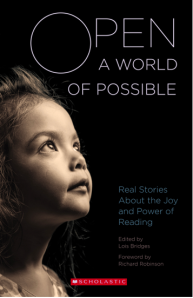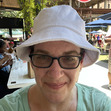This week, Scholastic announced its new global reading initiative, Open a World of Possible. Through education programs, print and online resources, and literacy events, the Open a World of Possible campaign promotes the importance of independent reading for children and provides tools to support and sustain independent reading initiatives in our home and school communities.
On the Open a World of Possible website, you can:
Watch the inspiring literacy campaign video written by National Student Poet, Sojourner Ahebee, and narrated by actress and mom, Sarah Jessica Parker and videos from kids, parents, and teachers celebrating their love for reading.
Register for the November 6th Bigger Than Words webcast with Usher.
Access Scholastic’s comprehensive reading research summary, The Joy and Power of Reading, and practical, research-based resources for parents and teachers.
Read Open a World of Possible: Read Stories About the Joy and Power of Reading, which includes over 100 essays from literacy thought leaders, researchers, teachers, and authors like Katherine Paterson, Jimmy Santiago Baca, Walter Dean Myers, Alfred Tatum, Penny Kittle, Franki Sibberson, and Colby Sharp. Share these essays at staff meetings, education classes, and parent programs. Children will adore reading and discussing author Kwame Alexander’s poem, “How to Read a Book.” The e-book is available as a free download.
I’m honored to participate in the Open a World of Possible initiative, which advocates for young readers and their families, and inspires us all to promote and encourage independent reading in our homes, classrooms, and communities.
As a sneak peek, enjoy my essay “Reading Sent Me to the Principal’s Office,” which appears in the Open a World of Possible anthology. My beloved elementary school librarian, Mrs. Potter, changed my reading life forever—a reminder of the power we have to influence children’s reading lives each day.

Reading Sent Me to the Principal’s Office
(excerpted from Open a World of Possible: Real Stories About the Joy and Power of Reading. Scholastic, 2014)
The only time I went to the principal’s office was because of reading. My mother claims this isn’t precisely true, but it’s my story, so I get to tell it how I want.
A precocious reader, I don’t remember a time when I couldn’t read. Knowing how to read by first grade didn’t seem like a problem to my mother and me, but my teachers thought differently. Initially enthusiastic about school, I was bored with the phonics worksheets and bland textbook stories that made up our school’s reading program. In third grade, my teacher, Mrs. Shugart introduced us to a new reading activity—SRA cards. Stored inside a large box, each color-coded card included a reading selection on one side and comprehension questions on the back. Mrs. Shugart tested each of us—determining where we should start in the SRA program, and for an hour every day, my classmates and I read SRA cards and answered questions.
I didn’t mind reading SRA cards. I knew I was a good reader and also a little bit of a show-off. I don’t remember where I started in Mrs. Shugart’s box, but I burned through those cards. Every day, when I turned in my questions, Mrs. Shugart clucked her tongue and scrutinized my work, “Three cards today? Are you sure you’re really reading them?” I stood at her desk while she checked my answers against the key. If I missed even one question, she would send me back to my desk to repeat a card—insisting that I read too quickly.
Eventually, I finished the last card in the box. Mrs. Shugart didn’t know what to do with me during SRA time, so she made me sit with other kids and help them read their cards. I hated it. One day, Mrs. Shugart returned from the office to find me standing at the chalkboard, chalk in hand, writing the answers to SRA cards on the board. With a gasp, she snatched me by the arm and marched me down to the principal’s office. The secretary called my mother.
No-nonsense about behavior and grades, my mother was unhappy about getting a call from school. Waiting for Mrs. Shugart, Mom asked me what happened, “You were cheating? What were you thinking, Donalyn?” While she talked with Mrs. Shugart and our principal, I sat outside the office in agony—imagining increasingly horrific punishments.
After an eternity, my mother emerged from the principal’s office and escorted me to the car. I kept my head down and my mouth shut. As we pulled out of the school parking lot, my mother sighed, “Did you know that Mrs. Shugart was standing there for three minutes before you noticed her? She says that you gave out at least ten answers and she has to skip those assignments with the other kids now.”
“Mom, I don’t think the other kids will mind skipping those cards,” I said, “What’s going to happen to me?”
“Well, I asked if you could move to the 4th grade reading class, but everyone nixed that suggestion. We came up with a different plan. Every day during reading time, you will go down to the library and help Mrs. Potter.”
And that’s what I did. Every day during SRA time, for the rest of third grade and into fourth grade, I worked as Mrs. Potter’s library aide. Looking back, I recognize that spending an hour a day with Mrs. Potter permanently influenced my reading life.
I don’t remember what Mrs. Potter looked like, but I can still hear her voice in my head, “Horses? You like horses? Have you met Marguerite Henry? Let’s start with King of the Wind.” After King of the Wind, I read every Marguerite Henry book in the library—Misty of Chincoteague, Brighty of Grand Canyon, and White Stallion of Lipizza. I read Anna Sewell’s Black Beauty, too.
When I ran out of horse books, Mrs. Potter steered me toward other animal books like Old Yeller by Frank Gipson, Rascal by Sterling North, and Marjorie Kinnan Rawlings’ The Yearling. Every book Mrs. Potter gave me launched another adventure.
Each time I returned a book, Mrs. Potter spent a few minutes chatting with me about the story, asking what I learned from the book and what parts I liked. Under her guidance, I read a staggering pile of books—Laura Ingalls Wilder’s Little House books, The Borrowers by Mary Norton, most of the Newbery winners, and selections from the Childhood of Famous Americans series. In my opinion, Mrs. Potter was a magician—able to find a book that matched any random interest of mine.
I took reading for granted before my two years with Mrs. Potter. I enjoyed reading, but I didn’t grasp the power of reading until she showed me. From then on, my education belonged to me because I loved to read. I can learn about anything, travel anywhere, ask my own questions and seek my own answers because I read. Thanks to Mrs. Potter’s wisdom and guidance, my life has been one long reading adventure—rich and exciting and mine.

 newest »
newest »
 newest »
newest »
 Thank you so much for sharing this memory! It brought back memories of my own elementary school years, which is when I fell in love with reading also. The librarian at our school, Mrs. Williams, played cards with my mother. So whenever the card game was hosted by my mother, I could count on extra books coming my way! As a fifth grade teacher, I'm always trying to make my students fall in love with reading. It's tough because I think there's a lot more competition for their attention. But I never give up! I'm glad you always seem to have terrific ideas for helping me!
Thank you so much for sharing this memory! It brought back memories of my own elementary school years, which is when I fell in love with reading also. The librarian at our school, Mrs. Williams, played cards with my mother. So whenever the card game was hosted by my mother, I could count on extra books coming my way! As a fifth grade teacher, I'm always trying to make my students fall in love with reading. It's tough because I think there's a lot more competition for their attention. But I never give up! I'm glad you always seem to have terrific ideas for helping me!






